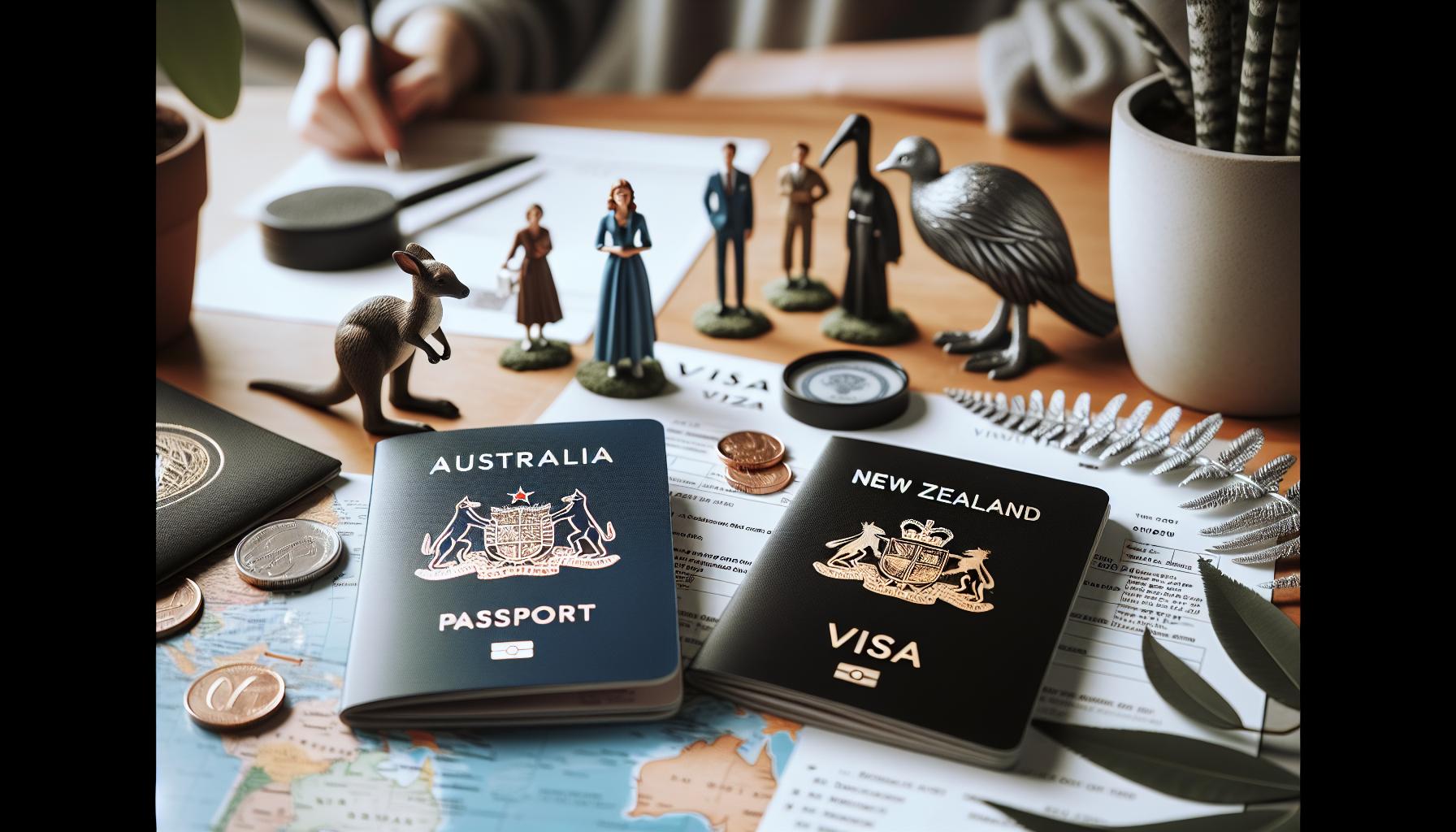Navigating visa regulations can be a daunting task, especially for students eager to explore new horizons. Many Australian students may wonder, “Can I travel to New Zealand with my Australian student visa?” Understanding the rules surrounding this inquiry is crucial for your travel plans. Importantly, an Australian student visa does not grant travel rights to New Zealand, meaning students must apply for a New Zealand visa to visit. This exploration is not just about compliance; it’s an opportunity to broaden your academic and cultural experiences. In this article, we’ll delve into the specific rules and options available for students, equipping you with the knowledge needed to make informed travel decisions. As you embark on your educational journey, let’s ensure your travel plans align with your studies and aspirations!
Understanding the Australian Student Visa for International Travel
Navigating the world of student visas can often feel overwhelming, especially when considering international travel. For students holding an Australian Student Visa (Subclass 500), there are unique travel rules to keep in mind when planning a trip to New Zealand. One critical aspect to note is that, unlike Australian permanent residents, individuals on a student visa do not have the privilege of visa-free travel to New Zealand. This means you’ll need a separate visa to enter New Zealand, regardless of your Australian student visa status.
When planning your journey, it’s important to understand that you must apply for a New Zealand student visa if you are considering studying there, or a visitor visa for leisure purposes. To apply, you’ll typically need an offer of placement from a New Zealand educational institution, along with other supporting documentation such as proof of funds, health insurance, and possibly a health check. Being well-prepared and aware of these requirements can ease your transition and enhance your travel experience.
Additionally, it is wise to familiarize yourself with customs and immigration regulations that may apply upon your arrival in New Zealand. For a smooth travel experience, consider preparing necessary documents, such as confirmation of onward travel and details of where you will be staying. Always check the latest travel advisories and entry requirements from official sources to avoid unexpected obstacles during your trip.
Remember, though your travel options may be limited compared to permanent residents, you can still explore New Zealand’s vibrant culture and beautiful landscapes with careful planning and the right visas in hand.
Eligibility Criteria for Traveling to New Zealand
Traveling to New Zealand as a student can be an enriching experience, but it comes with specific eligibility requirements you must meet, especially if you hold an Australian Student Visa. To ensure a smooth journey and comply with immigration laws, it’s crucial to be aware of the criteria for entering New Zealand.
The first step is to determine the type of visa you need. If you’re considering studying in New Zealand, you will need to apply for a New Zealand student visa. This process generally requires you to have an offer of placement from a recognized educational institution within New Zealand. You’ll also need to provide supporting documents, which may include proof of finances demonstrating your ability to cover living costs and tuition fees, health insurance, and in some cases, a health check. Make sure to verify these requirements with official sources, as they can frequently change.
For those planning to visit New Zealand for leisure or short-term travel while studying in Australia, applying for a visitor visa would be necessary. However, be mindful of the validity of your Australian student visa, as you may need to show that you comply with the conditions of your current visa while managing entry into New Zealand.
Lastly, keep in mind that students on temporary visas, unlike permanent residents, do not enjoy the luxury of visa-free travel. Planning well in advance can help you navigate through the immigration process without unnecessary stress. Understanding and fulfilling these eligibility criteria is key to making the most of your New Zealand experience.
Key Differences Between Australian and New Zealand Visas
Traveling internationally can often feel overwhelming, especially when navigating the complexities of various visa requirements. For students holding an Australian Student Visa, understanding the distinctions between Australian and New Zealand visas is crucial for achieving a seamless travel experience.
One significant difference lies in the application process. While Australian citizens and permanent residents can arrive in New Zealand and apply for a resident visa on-site, students from Australia with a temporary visa must first obtain a specific New Zealand student visa to pursue studies there. Unlike the Australian system, where a temporary study visa may have a straightforward application process adhering to course requirements, New Zealand requires students to present an offer of placement from a recognized institution, adequate financial evidence, and possibly health checks to qualify for a student visa.
The rights and benefits tied to each visa also differ. An Australian student visa typically allows for part-time work (up to 40 hours per fortnight during the semester), while New Zealand’s student visa grants international students the ability to work only under specific conditions, which vary depending on the program of study. Moreover, Australian permanent residents enjoy benefits such as the ability to study and work in New Zealand without a visa; however, this is not the case for those on temporary student visas.
Additionally, different levels of compliance and restrictions are enforced in each country’s immigration policies. For instance, Australian students must be aware of the necessity to comply with the conditions outlined in their student visa while in New Zealand, such as maintaining enrollment in their course and adhering to attendance requirements. This compliance ensures that students do not encounter unexpected issues while attempting to travel between the two countries.
Ultimately, understanding these vital differences will aid students in making informed decisions and planning their travel effectively, allowing them to focus on what truly matters: their educational journey and the adventures that lie ahead in New Zealand.
Application Process for Entry into New Zealand
Navigating the can be a pivotal step for students planning to further their studies. Unlike holders of an Australian student visa, who may have a more straightforward pathway to continue their education, prospective students aiming to study in New Zealand must follow specific guidelines to secure the appropriate visa. Understanding these requirements can greatly alleviate the stress often associated with international travel and academics.
First and foremost, an international student must apply for a New Zealand student visa if they plan to study there for more than three months. This application requires several essential components to ensure a successful outcome. Applicants need a confirmed placement at an accredited New Zealand institution, which serves as the foundation for the visa application. Accompanying this confirmation, students must demonstrate their financial capability to support themselves during their studies, typically by providing bank statements or proof of financial sponsorship. Additionally, depending on their country of origin and personal health conditions, some applicants may need to undergo medical examinations and obtain health insurance.
Another notable element of the application process is the requirement for police clearance certificates for certain applicants. This demonstrates a commitment to the standards of safety and conduct expected in the educational environment. While the application can be completed online, forming a comprehensive plan to gather the necessary documents in advance can ease the process. Being well-prepared not only reduces the risk of delays but also helps students focus on what truly matters: their academic and cultural pursuits in a new country.
Should any issues arise during the application process, New Zealand’s immigration office provides various resources and support for students. It is advisable to stay informed by regularly checking their official website or seeking guidance from the institution’s international student office, which can offer insight and assistance tailored to students’ unique situations. Understanding these steps and being proactive ensures a smoother transition as students embark on this exciting chapter in their academic journey.
Important Restrictions and Limitations to Consider
Traveling to New Zealand as a student planning to pursue education there can be an exciting venture. However, it is crucial to understand that an Australian student visa does not provide entry into New Zealand. Students must apply for the appropriate New Zealand visa that aligns with their study intentions. Here are some .
Firstly, visa requirements are strict, emphasizing that individuals with Australian student visas cannot use them to enter New Zealand. Instead, you will need to apply for a New Zealand student visa if you aim to study for more than three months. This additional requirement means that prospective students must plan ahead to gather necessary documentation, such as proof of admission to an accredited institution, financial statements confirming the ability to support themselves during their studies, and, in certain cases, medical clearance and police certificates.
Moreover, visa application processing times can vary significantly, so it’s wise to submit applications well in advance of planned travel dates. Students may face restrictions based on their country of origin or previous visa history that could delay the process further. Therefore, starting the application process early is essential, particularly during peak enrollment times when immigration offices may experience higher volumes of applications.
It’s also important to note that travel restrictions may arise due to health concerns or other geopolitical factors. Travel regulations can change rapidly based on global conditions, and students should stay informed about any travel advisories or entry requirements that may impact their ability to enter New Zealand when the time comes. Always check the latest updates from New Zealand’s immigration website or your intended educational institution for the most accurate information.
By understanding these limitations, students can better prepare for their educational journey and navigate the complexities involved in securing the appropriate visa for studying in New Zealand.
Navigating Customs and Immigration in New Zealand
can initially feel daunting, especially for students accustomed to the Australian travel system. However, understanding the process can significantly ease your journey. Upon arrival in New Zealand, you’ll encounter customs and immigration officials who will check your documents and ask questions about your stay. This is a routine step aimed at ensuring the safety and compliance of travelers entering the country.
It’s crucial to have all necessary documentation organized and readily available. Make sure you have your passport, New Zealand visa (if applicable), return ticket, and any supporting documents related to your study program readily accessible. In most cases, students must present proof of enrollment in an educational institution, along with evidence of sufficient funds to support themselves during their stay. Financial statements or a scholarship letter can work well as documentation.
The New Zealand customs process is rigorous in terms of biosecurity. Travelers should declare any food, plants, or animal products to avoid hefty fines. Be honest about what you are bringing into the country, as New Zealand maintains strict biosecurity laws to protect its unique environment. You can find a detailed list of prohibited items on the New Zealand Customs Service website.
To streamline your entry process, consider filling out the arrival card accurately before landing. This card collects information used by the immigration officials to assess your eligibility for entry and helps expedite your passage through customs. If you encounter any issues during the immigration process, remain calm and polite. Immigration officers are there to ensure compliance with the laws, and showcasing respect can facilitate smoother interactions.
Lastly, staying informed about entry requirements and restrictions is key. Regulations can change, so regularly check the New Zealand government’s immigration website for updates, especially regarding health advisories or travel restrictions that could affect your journey. Proper preparation and knowledge can transform what seems like a complex process into a manageable step towards your educational adventure in New Zealand.
Tips for a Smooth Travel Experience
Traveling to New Zealand can be an exciting adventure for students, especially those eager to explore educational opportunities abroad. However, a well-planned journey can significantly enhance your experience and ensure a smooth transition into your new environment. Start by ensuring all your documents are organized. This includes your passport, any required New Zealand visa (if applicable), proof of enrollment in your educational institution, and evidence of adequate funds to support your stay. Keeping these documents in a secure, easily accessible location can save you from unnecessary stress upon arrival.
When packing, remember to consider New Zealand’s strict biosecurity rules. Prior to your trip, familiarize yourself with what items you may need to declare at customs. It’s essential to declare any food, plants, or animal products, as failing to do so can result in hefty fines. Being proactive about these requirements not only ensures compliance but also reflects your respect for New Zealand’s unique environment.
Additionally, filling out your arrival card accurately before landing can streamline your customs process. This card is essential for immigration officials to assess your eligibility for entry and helps speed up your passage through customs. If any issues arise during your immigration process, stay calm and respectful towards the officers. A polite demeanor can foster a more favorable interaction and help resolve potential complications more smoothly.
Lastly, make a habit of checking the New Zealand government’s immigration website for the most current travel and health advisories. Regulations can change, and staying informed will help you navigate any new requirements. By preparing thoroughly and staying adaptable, you can transform your travel experience into a positive beginning for your educational journey in New Zealand.
Alternatives for Students Interested in Studying in New Zealand
Exploring opportunities in New Zealand can be an enriching experience for students currently studying in Australia. If you are contemplating furthering your education or even switching institutions, New Zealand offers a wide range of programs that could suit your academic interests. One attractive alternative is enrolling in a New Zealand university or polytechnic as an international student.
To begin with, consider what specific fields of study interest you. New Zealand is renowned for its unique educational offerings, particularly in areas such as environmental science, marine biology, and hospitality management, thanks to its rich natural landscapes and vibrant tourist industry. Research various institutions that excel in these areas; institutions like Victoria University of Wellington or Auckland University of Technology often receive high marks for their comprehensive programs. It’s important to compare tuition fees and living expenses, as these factors can impact your overall budget.
When you decide to apply to a New Zealand institution, ensure you gather all necessary documentation including transcripts, English language proficiency results (like IELTS or TOEFL), and a statement of purpose. The application process generally requires an online submission, and many universities have dedicated support teams to help international students navigate this. Keep an eye out for scholarship opportunities designed specifically for international students, as this can significantly alleviate financial pressures.
Lastly, if you are currently on a student visa in Australia, remember that changing countries for your studies will necessitate applying for a New Zealand student visa. Having a solid grasp of the application criteria-such as proof of sufficient funds, an acceptance letter from a New Zealand institution, and health insurance-will make this transition smoother. Engaging with current students or alumni from New Zealand universities can provide invaluable insights into the cultural adjustments you might need to make. Embracing this adventure can lead to a wealth of academic and personal growth, enhancing your educational journey in an inspiring new environment.
Resources for Additional Support and Information
Acquiring the right resources and support is essential when navigating the transition from studying in Australia to pursuing education in New Zealand. Students often feel overwhelmed by the visa and application processes, but numerous avenues exist to ease the journey. Connecting with educational consultants who specialize in international student services can provide personalized guidance and clarity. They can help you understand the specific visa requirements, assist with documentation, and ensure that you are on the right track to a seamless transition.
Official Government Websites
Utilizing official resources is vital for obtaining accurate and up-to-date information. The New Zealand government’s immigration website offers detailed guidance on student visa applications, eligibility criteria, and essential documents needed for studying in the country. Additionally, the Study in New Zealand website provides comprehensive resources tailored for international students, from location insights to living conditions, which are invaluable for prospective applicants [[1](https://www.studywithnewzealand.govt.nz/en/plan-your-studies/visas)].
Student Networks and Organizations
Engaging with student organizations or international student networks can provide real-world insights and support. These groups often host events, workshops, and social gatherings, allowing you to meet students who have experienced similar challenges. They can also connect you with alumni who can share their experiences and provide tips on adapting to the New Zealand educational environment and culture.
Scholarship Opportunities
Financial support can significantly alleviate the pressures of studying abroad. Research and apply for scholarships available to international students, specifically from governmental and institutional sources. Some universities in New Zealand offer scholarships for outstanding international students that can cover tuition fees or provide living stipends. Websites dedicated to scholarships, such as the New Zealand Scholarships site, can help you find opportunities matching your qualifications and needs.
For additional information, consider reaching out to your current institution’s international student office, which can provide tailored advice and possibly even partnerships with New Zealand schools. Taking these steps will ensure you are well-prepared, informed, and supported throughout your educational journey in New Zealand.
Common Questions About Student Travel to New Zealand
Traveling from Australia to New Zealand as a student can raise several important questions, especially concerning visa requirements and entry regulations. One common query is whether students on an Australian Student Visa can travel to New Zealand without an additional visa. Generally, the answer depends on your nationality. If you hold a passport from a visa-waiver country, you may enter New Zealand as a visitor without needing a separate visa. However, if you are from a country that requires a visa to enter New Zealand, you’ll need to apply for a visitor visa or another appropriate visa type before traveling.
Another frequent concern involves the specific rules governing the duration of stay in New Zealand. Typically, visa-waiver travelers can remain in New Zealand for up to three months. It’s crucial to keep in mind that your time in New Zealand must be compliant with the entry conditions relevant to your nationality. Exceeding the allowed stay can lead to serious legal repercussions and affect future travel plans.
Many students also wonder about the implications of their student status while traveling. While on an Australian Student Visa, students can generally leave Australia for short trips, including travel to New Zealand. However, it is advisable for students to confirm that all their study obligations are met before travelling, as returning to Australia can come with certain requirements, such as maintaining full-time enrollment in a registered course.
If you’re planning to extend your studies in New Zealand after visiting, you’ll need to undertake a separate student visa application for New Zealand, complying with specific eligibility requirements, such as proof of acceptance into a New Zealand educational institution. Being proactive in understanding both Australian and New Zealand immigration policies can simplify your travel experience and ensure compliance with all rules and regulations.
Student Health Insurance and Travel Requirements
Traveling can be an exhilarating experience, especially when exploring the stunning landscapes and vibrant culture of New Zealand. However, before you set off, understanding the health insurance and travel requirements is crucial for a seamless journey. While your Australian Student Visa allows you to study in Australia, it doesn’t grant you automatic access to New Zealand. Hence, securing appropriate travel health insurance and understanding the entry requirements becomes essential.
Health insurance for international travel can help mitigate unexpected medical expenses while abroad. It’s advisable to opt for a travel insurance policy that covers health, accidents, and other emergencies. Ensure that your policy includes coverage for hospitalization, medical evacuation, and trip cancellations. Many insurance providers offer specialized plans for students that may also include coverage for participation in sports and adventure activities, which are plentiful in New Zealand. Always read the fine print and confirm that the policy meets your needs.
Regarding travel to New Zealand, if you hold an Australian student visa, you’ll need to check whether you require a visa or a New Zealand Electronic Travel Authority (NZeTA) based on your nationality. Most travelers from visa-waiver countries can enter New Zealand for short stays without a visa, while those from other countries must secure an appropriate visa. Additionally, it’s important to have a valid passport, and travel insurance can often be a requirement for visa applications.
When preparing for your trip, consider the following travel insurance checklist:
- Medical Coverage: Ensure it covers international healthcare.
- Adventure Sports: Check if the policy covers activities you plan to engage in.
- Cancellation Protection: Look for reimbursement options if your plans change.
- Emergency Assistance: Access to a helpline for emergencies is vital.
Planning your health insurance and travel documentation ahead of time will allow you to focus on the adventures that await you in New Zealand. Being informed and prepared will not only minimize stress but also enhance your overall travel experience.
Understanding the Cultural Differences and Lifestyle in New Zealand
New Zealand is not just a destination; it’s an experience enriched with unique cultural nuances and a vibrant lifestyle that can be both fascinating and daunting for newcomers. When transitioning from Australia, students may find that the Kiwi way of life includes distinct social norms, values, and customs. Understanding these elements can facilitate smoother integration and provide invaluable insight into daily interactions, making your stay more enjoyable and rewarding.
One of the most notable aspects of Kiwi culture is the emphasis on diversity and community. New Zealand prides itself on being a multicultural hub, with a strong influence from Māori culture. The principle of “manaakitanga,” which reflects hospitality and kindness, plays a significant role in social interactions. Students will find that Kiwis are generally warm and welcoming, encouraging newcomers to engage in community events, local gatherings, and cultural festivals. Participating in these activities can foster connections and friendships that enrich your experience.
Moreover, the lifestyle in New Zealand promotes a balanced approach to life. While academic success is important, Kiwis place a high value on outdoor activities, wellness, and community engagement. The breathtaking landscapes provide ample opportunities for hiking, biking, and exploring nature, aligning perfectly with the local ethos of valuing the environment. Embracing an active lifestyle not only enhances personal well-being but also allows students to connect with others who share similar interests.
Key Cultural Tips for Students
- Embrace the Outdoors: Make time for recreational activities. Engaging with nature is a big part of life in New Zealand.
- Respect Māori Culture: Learn about the customs and traditions of the Māori people. Understanding this aspect of New Zealand culture can provide deeper insights into the nation’s heritage.
- Participate in Community: Get involved in local events, clubs, or volunteer activities. This is a great way to meet people and integrate into the community.
- Be Open to New Experiences: Dive into the local cuisine, music, and art. Familiarizing yourself with New Zealand’s cultural offerings can enhance your journey.
Adapting to life in a new country can be challenging, but embracing these cultural differences will not only make your experience in New Zealand more fulfilling but will also help you grow personally and academically. The journey ahead is not just about studying; it’s about exploring a new way of life that could shape your future in unexpected and wonderful ways.
Faq
Q: Can I travel to New Zealand with an Australian student visa?
A: No, an Australian student visa does not permit travel to New Zealand. Travelers must obtain a New Zealand visa or an NZeTA (New Zealand Electronic Travel Authority) for entry, even for short visits. Check the specific visa requirements for your situation before traveling.
Q: What is the NZeTA and do I need one?
A: The NZeTA is the New Zealand Electronic Travel Authority. It is required for most travelers from visa-waiver countries, including Australians, visiting for tourism or short business trips. Apply online before your trip to ensure smooth entry into New Zealand.
Q: How do Australian students apply for a visa to New Zealand?
A: Australian students can apply for a New Zealand visitor visa or an NZeTA online. Depending on the purpose of travel, choose the appropriate option and follow the application guidelines provided on the New Zealand immigration website for detailed instructions.
Q: Are there travel restrictions for Australian students visiting New Zealand?
A: Yes, Australian students need to consider specific travel restrictions, including health requirements and necessary documentation. Always check the latest guidelines from New Zealand immigration before planning your trip to ensure compliance with current regulations.
Q: Can I work in New Zealand on an Australian student visa?
A: No, you cannot work in New Zealand with an Australian student visa. If you wish to work while in New Zealand, you need to apply for a work visa or ensure your visitor visa allows for specific work permissions.
Q: What documents are required for Australians traveling to New Zealand?
A: Australians need a valid passport, an NZeTA (if applicable), and any additional documents related to their stay, such as travel itineraries or proof of accommodation. Be sure to ensure your passport is valid for the duration of your stay.
Q: How long can I stay in New Zealand with a visitor visa?
A: A visitor visa typically allows Australians to stay in New Zealand for up to 6 months. However, the exact duration may vary based on individual circumstances and the specifics of the visa granted.
Q: What should I know about customs when traveling from Australia to New Zealand?
A: Be aware that New Zealand has strict customs regulations regarding specific food, plant, and animal products. It’s essential to declare any goods to avoid fines and ensure a smooth entry process. Always check the customs guidelines before your journey.
Concluding Remarks
Now that you understand the rules for traveling to New Zealand with an Australian student visa, it’s time to take action! Whether you’re exploring opportunities for travel, study, or work, being informed is crucial. Don’t miss out on checking our comprehensive guides on visa applications and travel requirements for New Zealand to ensure you’re fully prepared.
If you still have questions or need clarity on specific details, feel free to comment below or explore our connected articles on scholarships and international student insights. Sign up for our newsletter to receive the latest information directly to your inbox, ensuring you stay updated on everything you need for your educational journey. With the right preparation, your adventure in New Zealand awaits!









